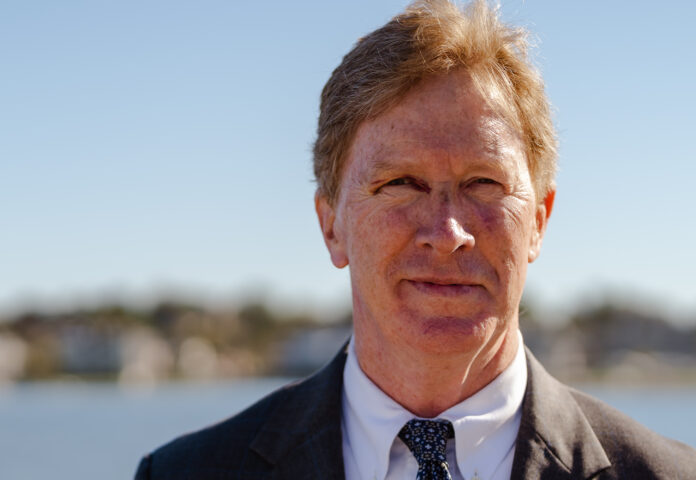PROVIDENCE – Business leaders in Rhode Island are urging caution and careful planning as the nation braces itself for a recession, interest rates continue to climb and regional financial institutions feel the aftershocks of the collapse of Silicon Valley, Signature and First Republic banks.
“I hew to a sailing analogy: Keep out of harm’s way. Make the fewest mistakes and do no harm,” said Jamie Hilton, managing director in private wealth management with the Hilton Group of UBS Financial Services. “A large part of what I do is keeping my clients from making emotional decisions.”
Hilton, a Newport-based member of the Rhode Island CEO Council, is only half-kidding when he describes himself as a “financial behavioral therapist.”
Investors and business owners “read the news and feel like it’s today’s version of the end of the world. They feel they need to get out,” Hilton said. But emotional behavior usually only makes things worse. “Stick with the plan. Be patient, and don’t get into that life raft unless the boat is sinking and the water is over the gunwals.”
The market will always have downturns, said Hilton, whose sailing metaphors come naturally as co-founder of the University of Rhode Island Sailing Advisory Council.
“Part of what I do is help people understand that the specific circumstances are new and unique, but we’ve seen this process many times before,” he said.
UBS, Hilton said, expects there will be a slowing of economic growth. After the 10th straight hike in the federal funds rate since March 2022, UBS believes the Federal Reserve will start cutting rates by year’s end, Hilton said.
Fear plays an outsized role in shaping the economy, both nationally and in the Ocean State, said Peter Nigro, Sarkisian chair in financial services at Bryant University.
‘The bank collapses just increase that fear. And fear is not good,” said Nigro, who formerly servied as a senior economist wth the U.S. Office of the Comptroller of the Currency. “Banks oil the economy and when they pull back, things seize up. Banks are definitely tightening lending standards.”
Smaller banks are preparing for greater scrutiny from regulators in the wake of the implosions, Nigro said.
“This is across the nation, it’s not limited to New England,” he said.
They are also rushing to build their balance sheets after seeing an outflow of cash to the financial institutions once deemed “too-big-to-fail.”
“Look whose CD rates have gone up,” Nigro said. “They’re trying to attract deposits.”
Providence-based Citizens Bank last month offered nearly 5% on a 10-month certificate of deposit, Nigro said, before the bank dropped its teaser rate to 2.75%.
Westerly-based The Washington Trust Co. currently is offering 5% on an 11-month CD. Baycoast Bank is offering 4% annual percentage yield on a 10-month CD.
As far as inflation goes, “the U.S. is the best of a bad lot,” Nigro said.
“We’re at 5% inflation. The U.K. is at 10%, and the European Union is at 7%,” he said.
But some Rhode Island businesses are still feeling acute pain.
“The biggest thing right now that‘s affecting me is the cost of money,” said Robert Salvatore, CEO of CyberComm Inc., a Warwick-headquarted telecommunications equipment provider. “That’s because of inflation and the general economy. It’s slowing my roll.”
Salvatore said he has unfunded projects that are going to cost more.
“I may have to go to private money rather than a bank,” he said. “People keep telling me a recession is coming. The reality is it’s already here.”
Salvatore said his gasoline expenses are up more than $8,000 a month.
“That’s where it hits me the most,” said Salvatore, a member of the Rhode Island CEO Council. “It’s 8K you don’t have for something else. That’s $96,000 a year. That’s an employee and a new van. The opportunity cost of that expense is disheartening.”
The current economic climate is largely unprecedented, said Mark Wu, associate professor of finance at Roger Williams University.
“I don’t think anyone has a crystal ball. Especially because this has never happened anywhere in our history,” said Wu, who has worked on projects focused on bank runs. “You have slow economic growth with extremely high inflation at the same time, that’s rare.”
That combination amplifies a sense of instability and the fear that comes with it.
“Also rare is what happened with capital markets,” Wu said. “From an investor’s perspective, if you think the economy is doing not well, you go to the bond market. But the last year came a big surprise. Both stocks and bonds lost significant value. It’s never happened before at this magnitude. The bond market hasn’t served as a hedge. In the past it was, but not last year.”
Marcelino “Marc” De Santiago is president and chief operating officer of Hope Global, a multinational textile manufacturer based in Cumberland.
De Santiago, also a member of the Rhode Island CEO Council, said dealing with economic uncertainty is just part of the job.
“Our duty as executives is to detect megatrends and prepare for them,” De Santiago said. “If you want to be in the manufacturing business, you need to be constantly weighing the financial risks.”
Good planning has kept his company insulated from economic turmoil.
“At Hope Global, we don’t have an issue with interest rates right now,” De Santiago said. “We are managing everything with our own resources. We are paying everything with the cash we receive from our business.”
De Santiago said the company hasn’t seen a drop-off in sales but has “experienced more changes in the mix of products we are selling.”
Hope Global has focused on more regional supply chains to avoid future disruptions and stepped up its cybersecurity efforts, he said.
The weaker dollar – brought on by inflation, interest rate hikes and the war in Ukraine – has been, on the whole, good for Hope Global.
“China is our No. 1 partner now, more than Mexico,” De Santiago said. “An ‘accessible’ dollar allows us to do more business with the rest of the world. If a stronger dollar returns, we’ll be calm and prepared. We’ll be ready for that, too.”
Sam Wood is a PBN staff writer. Contact him at Wood@PBN.com.












